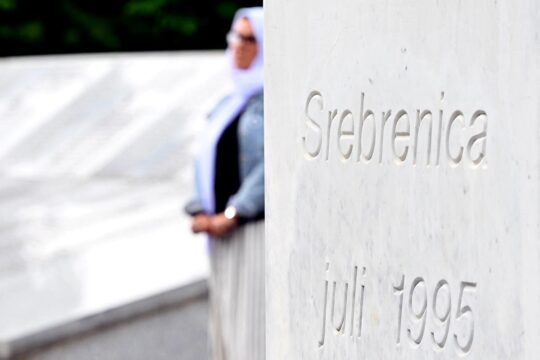Former Bosnian Serb leader Radovan Karadzic on Thursday faces judgement for crimes committed during Bosnia's 1992-95 war including the Srebrenica massacre, the worst atrocity committed on European soil since World War II.
Almost 8,000 Muslim men and boys were slaughtered after the eastern Bosnian enclave was overrun by Bosnian Serb forces in July 1995.
It was one of the darkest episodes of Bosnia's bloody three-year civil war which claimed some 100,000 lives and left 2.2 million others homeless during the break-up of the former Yugoslavia in 1991.
What happened:
Declared a "safe area" by the UN in April 1993, the mainly-Muslim town of Srebrenica was surrounded by Bosnian Serb army forces in a slow stranglehold for the next two years.
On the morning of 11 July, 1995, the Bosnian Serbs' army finally overran Srebrenica, causing tens of thousands of refugees to flee to the UN peacekeeping force's compound at Potocari on the hilly town's northern outskirts.
The peacekeepers and about 5,000 refugees, mostly women and children, retreated into the UN base, while thousands of others gathered outside.
The refugees inside the base were eventually expelled into the hands of waiting Bosnian Serb troops, who started forcibly busing people out, separating the men and boys from the women.
In the following days almost 8,000 Muslim men and boys were systematically butchered by the Bosnian Serb forces under Ratko Mladic's command and their bodies dumped in mass graves.
Some bodies were later moved to secondary graves to conceal the evidence. Some 6,600 of the massacre victims have been exhumed, identified and reburied.
Prosecution:
The International Criminal Tribunal for the former Yugoslavia (ICTY) has indicted 20 suspects for crimes committed at Srebrenica. All have been arrested and brought to The Hague.
Fourteen convictions have so far been handed down including five for genocide. Besides Karadzic, three other people including Mladic still face charges for Srebrenica.
Key sentences:
- Zdravko Tolimir -
Considered Mladic's right-hand man, Tolimir was handed a life sentence in April 2015. The former intelligence and security chief was found guilty of genocide and other crimes. He died in February while awaiting transfer from the ICTY's detention centre.
- Radislav Krstic -
The Bosnian Serb general led the attack on Srebrenica and was the first-ever suspect to be convicted of aiding and abetting genocide. Sentenced to 35 years in prison, his case was upheld on appeal in April 2004.
- Popovic and others -
The ICTY on appeal in January 2015 confirmed two life sentences for Vujadin Popovic and Ljubisa Beara, two senior officers in the Bosnian Serb army convicted of genocide. Four other accused were sentenced to between 13 and 35 years. A seventh accused, Milan Gvero, has subsequently died after being convicted.
- Vidoje Blagojevic and Dragan Jokic -
A senior officer in the Bosnian Serb army, Blagojevic was sentenced to 15 years and Jokic was handed a nine-year sentence for war crimes and crimes against humanity.
Trials currently underway:
- Ratko Mladic -
Mladic's defence has been ongoing since May 2014, but the prosecution was recently allowed to add more elements to the case after the discovery of a new mass grave. Mladic faces similar charges to Karadzic. Judgement is expected in November 2017.
- Jovica Stanisic and Franko Simatovic -
Judges ordered that former Serbian intelligence chief Stanisic and his deputy Simatovic be retried after being acquitted in May 2013.
Acquittals:
- Momcilo Perisic -
The former Yugoslav ex-army chief was acquitted on appeal in February 2013, after having been initially sentenced to 27 years.
Died during trial:
- Slobodan Milosevic -
The former Yugoslav president and Serbian strongman died in detention in March 2006, facing genocide, war crimes and crimes against humanity charges.





